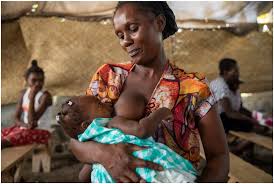In Nigeria, where the bonds of family and community are deeply cherished, many women carry the hidden burden of sexual assault. This trauma not only affects their mental and physical health but also has profound implications for their ability to nurture their children. Analyzing the biochemical changes in breast milk provides crucial insights into how sexual assault impacts maternal and child health.
The Biochemical Composition of Breast Milk
Breast milk is a complex and dynamic fluid that provides essential nutrients, antibodies, and hormones necessary for an infant’s growth and development. It is influenced by a mother’s health, nutrition, and emotional well-being. Trauma from sexual assault can alter the biochemical composition of breast milk, potentially affecting its quality and the health of the infant.
The Nigerian Context of Analyzing the Biochemical Changes in Breast Milk of Nigerian Women Who Have Experienced Sexual Assault
In Nigeria, cultural stigma and limited access to mental health care often prevent women who have experienced sexual assault from seeking help. Understanding how trauma affects breast milk can inform support strategies to ensure that both mothers and their children receive the care they need.
Unveiling the Changes of Analyzing the Biochemical Changes in Breast Milk of Nigerian Women Who Have Experienced Sexual Assault
Research into the biochemical changes in breast milk reveals several key factors:
- Hormonal Disruptions: Trauma can disrupt the balance of hormones such as oxytocin and prolactin, which are crucial for milk production and ejection.
- Nutrient Composition: Stress and trauma can affect the nutritional content of breast milk, including levels of essential fatty acids, vitamins, and impacting the overall nutrition of the value of the milk.
Bridging the Gap with Support
To support Nigerian women who have experienced sexual assault, it is essential to address both their emotional and physical health:
- Mental Health Services: Expanding access to counseling and psychological support can help mothers manage stress and trauma, improving their overall well-being and, consequently, the quality of their breast milk.
- Nutritional Support: Providing nutritional counseling and supplements can help mitigate the effects of stress on breast milk composition.
- Community Support: Creating a supportive community environment where women feel safe to share their experiences and seek help is crucial for their recovery.
Toward Healing and Nourishment
Addressing the biochemical changes in breast milk caused by trauma requires a holistic approach:
- Awareness Campaigns: Raising awareness about the impact of trauma on breastfeeding can help reduce stigma and encourage more women to seek help.
- Training Healthcare Providers: Ensuring that healthcare providers are trained to recognize and address the needs of mothers who have experienced sexual assault can improve the quality of care.
- Policy Advocacy: Advocating for policies that support mental health services and protect women’s rights can create a more supportive environment for affected mothers.
In the journey to nourish hope for Nigerian women who have experienced sexual assault, understanding and addressing the biochemical changes in their breast milk is a crucial step. By providing comprehensive support, raising awareness, and fostering a compassionate community, we can ensure that these resilient mothers have the resources they need to nurture their children and themselves. Through concerted efforts, we can transform trauma into a pathway to healing, offering a brighter future for both mothers and their infants
- Exploring the Neuroimaging of Infertility-Related Stress: A Nigerian Perspective - May 1, 2023
- The Silent Battle: Investigating the Biochemical Effects of Chronic Stress in Nigerian Women Facing Gender-Based Violence - March 22, 2023
- The Biochemical Effects of Estrogen Therapy in Transgender Women - March 7, 2023


